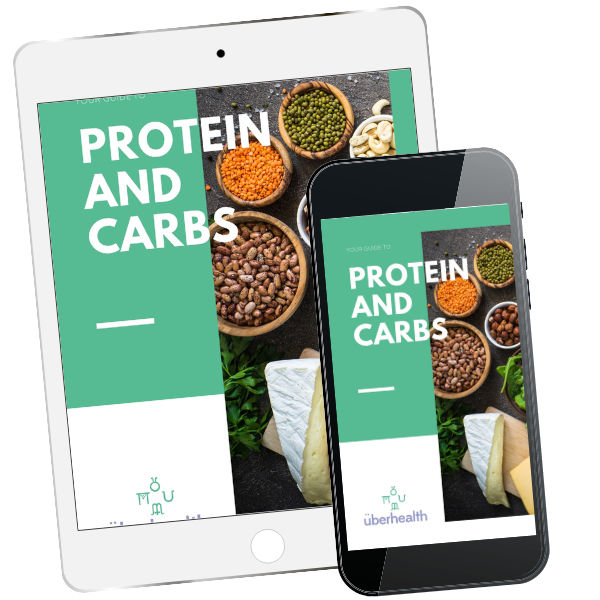Weight Loss Supplements for Athletes: What Works, What Doesn’t, and What to Avoid

When it comes to weight loss in sport, supplements are one of the most hyped and misunderstood areas. From protein powders to “fat burners,” athletes are bombarded with promises of quick results.
In reality, supplements are the icing on the cake, not the cake itself.
Training, nutrition, and recovery provide the real foundation for safe, sustainable body composition changes. Supplements may offer a boost, but only when used wisely and in the right context.
Why Athletes Turn to Supplements
Athletes often feel pressure — from coaches, competition, or even internal expectations — to optimise body composition. In many sports, being leaner is associated with improved performance, whether it’s for speed, aesthetics, or endurance.
Supplements can seem attractive because:
⚡ They promise quick results in a world where training and nutrition take time.
🧪 They’re widely marketed with “science-sounding” claims, often without context.
⏱️ They appear convenient, offering an easy fix compared to long-term changes in diet and recovery habits.
🏅 Some are even recommended by practitioners, especially when athletes are struggling with hunger, recovery, or energy while in a calorie deficit.
The problem?
While a few supplements can help, many offer only marginal effects, and some put athletes at serious risk. That’s where understanding energy availability and RED-S becomes crucial.
Understanding RED-S (Relative Energy Deficiency in Sport)
RED-S occurs when there’s a mismatch between the energy an athlete consumes (through food and drink) and the energy they expend (through training, recovery, and daily living). This low energy availability can happen accidentally or deliberately when trying to lose weight.
Consequences of RED-S include:
🚺 Hormonal disruption (irregular or absent menstrual cycles in females; reduced testosterone in males).
🦴 Bone health issues (stress fractures, decreased bone mineral density).
🧠 Mood and concentration changes (irritability, low motivation, brain fog).
⚡ Performance declines (slower recovery, reduced training capacity, higher injury risk).
🛌 Impaired immunity and sleep (more frequent illness, disrupted rest).
The International Olympic Committee recognises RED-S as a major health and performance risk. Any weight-loss strategy — supplement or otherwise — should only be considered alongside careful monitoring of energy availability.
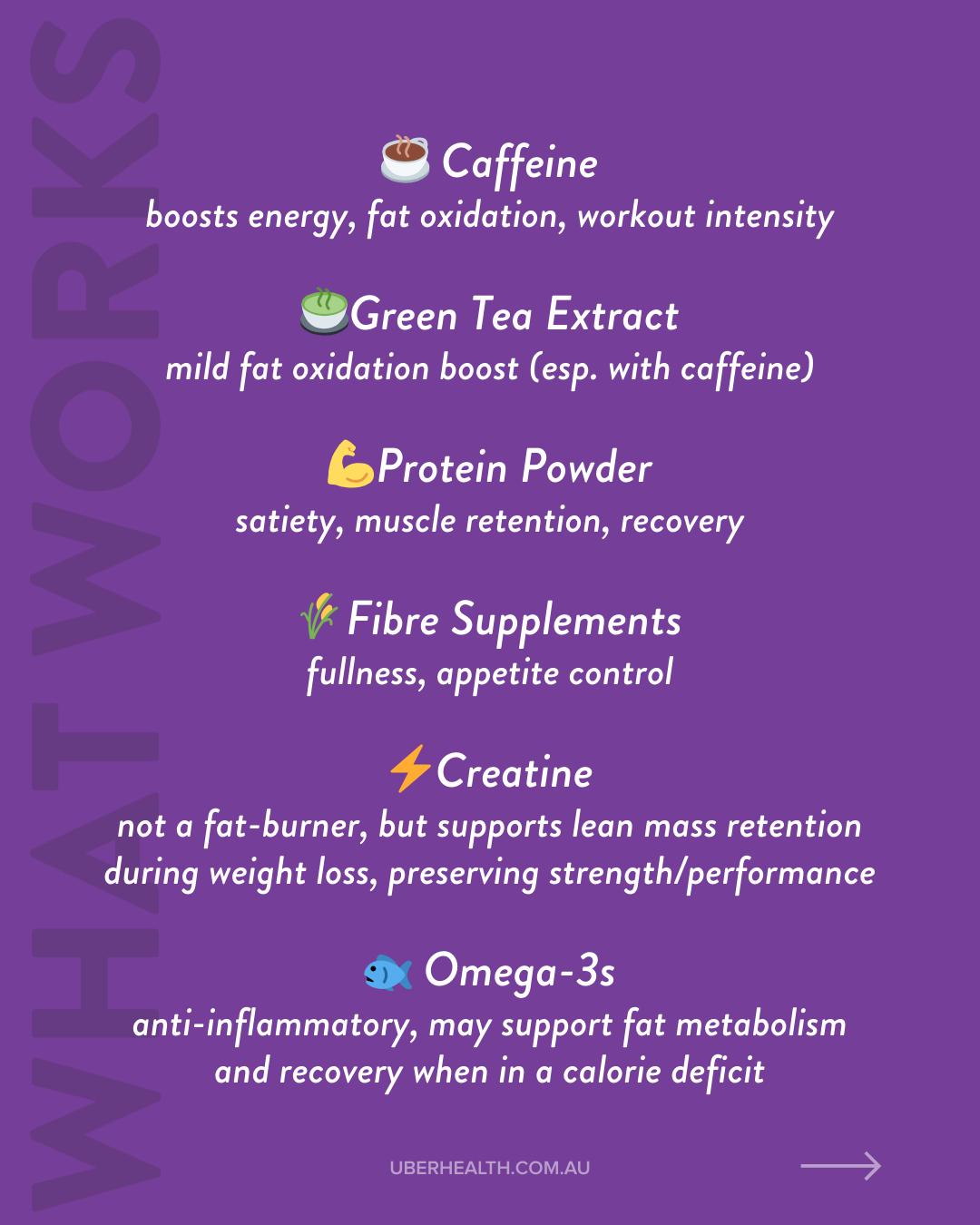 |
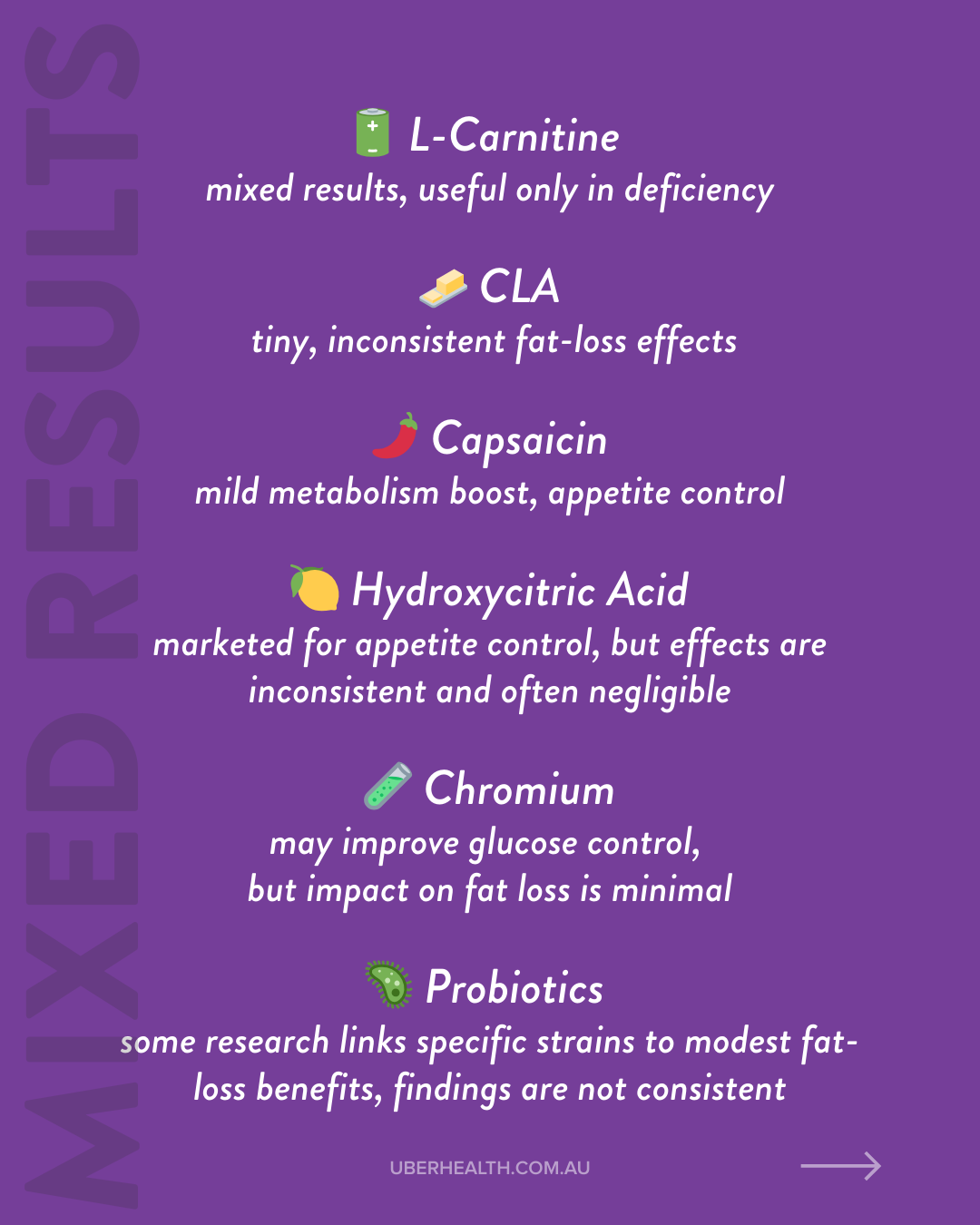 |
Weight Loss Supplements for Athletes
So, if you are considering supplements for weight loss, which supplements are worth considering, and which belong in the bin?
Let’s break it down...
Weight Loss Supplements That Work
Research shows some supplements can support athletes during weight loss, mostly by improving training quality, recovery, or appetite regulation.
-
Caffeine
Boosts energy, fat oxidation, and workout intensity. Best used strategically around training. -
Green Tea Extract
Contains EGCG, which may slightly increase fat oxidation, especially when combined with caffeine. Effects are modest but real. -
Protein Powder
Helps preserve lean muscle, supports recovery, and keeps hunger in check. Whey, casein, or plant-based powders all work when total protein needs aren’t being met from food. -
Fibre Supplements
Options like psyllium husk or glucomannan promote fullness, slow digestion, and support appetite control. -
Creatine
Not a fat burner — but protects muscle mass and strength during calorie deficits, which is crucial for athletes. -
Omega-3s
Anti-inflammatory, may improve fat metabolism, recovery, and overall metabolic health when in an energy deficit.
Weight Loss Supplements with Mixed Results
These supplements are popular but have limited or inconsistent evidence:
-
L-Carnitine → may help in those with a deficiency, otherwise minimal benefit.
-
CLA (Conjugated Linoleic Acid) → tiny fat-loss effects, often negligible.
-
Capsaicin → mild metabolism boost, may reduce appetite.
-
Hydroxycitric Acid (Garcinia cambogia) → marketed for appetite suppression, results are inconsistent.
-
Chromium → may support glucose control, with little impact on fat loss.
-
Probiotics → strain-specific benefits possible, but not consistent.
Bottom line: These are not harmful, but they shouldn’t be relied on.
🚫 Avoid These Weight Loss Supplements
This is where things get risky. Many supplements marketed as “fat burners” or “quick fixes” are unsafe, ineffective, or outright banned in sport.
-
“Fat burner” blends → unregulated, often spiked with stimulants.
-
Diuretics / laxatives → just water loss, not fat loss; risk of dehydration and electrolyte imbalance.
-
Hormone-based products → unreliable and banned in sport.
-
Ephedra / ephedrine → linked to cardiovascular events; banned.
-
DMAA/DMHA “pre-workout” stimulants → banned, potentially dangerous.
-
HCG drops → no evidence, unsafe.
-
Keto pills → usually just salts or caffeine; no fat-loss benefit.
-
High-dose Yohimbine → raises heart rate, blood pressure, and anxiety.
-
Bitter Orange / Synephrine → stimulant effect, cardiovascular risk.
-
Apple Cider Vinegar → tiny effect on appetite, no real fat-loss results.
-
DNP (2,4-Dinitrophenol) → extremely dangerous, linked to deaths, completely banned.
-
Raspberry Ketones, Forskolin, detox teas, “toning” gummies, unlabelled thermogenics → overhyped, no meaningful evidence.
If it sounds too good to be true, it probably is.
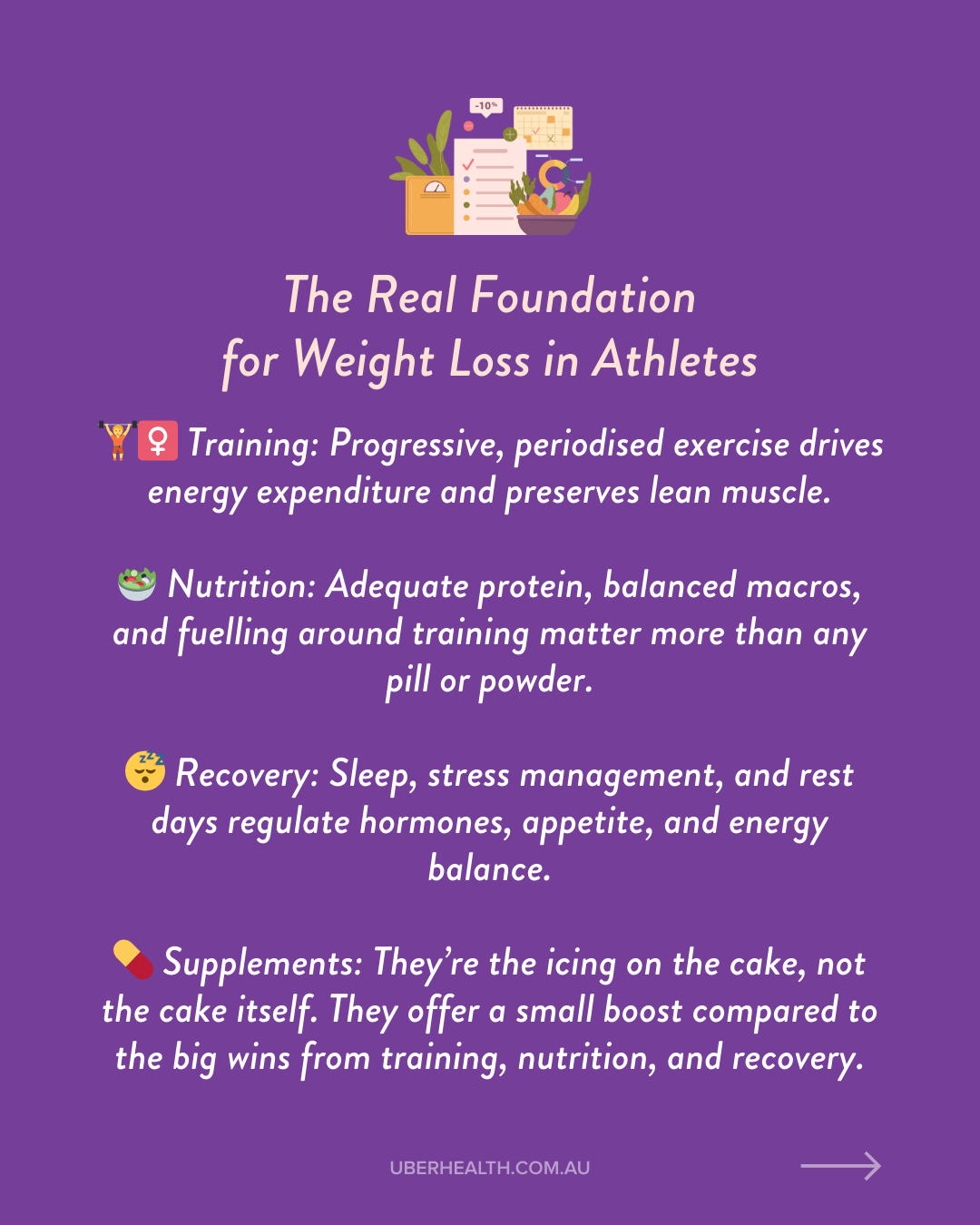 |
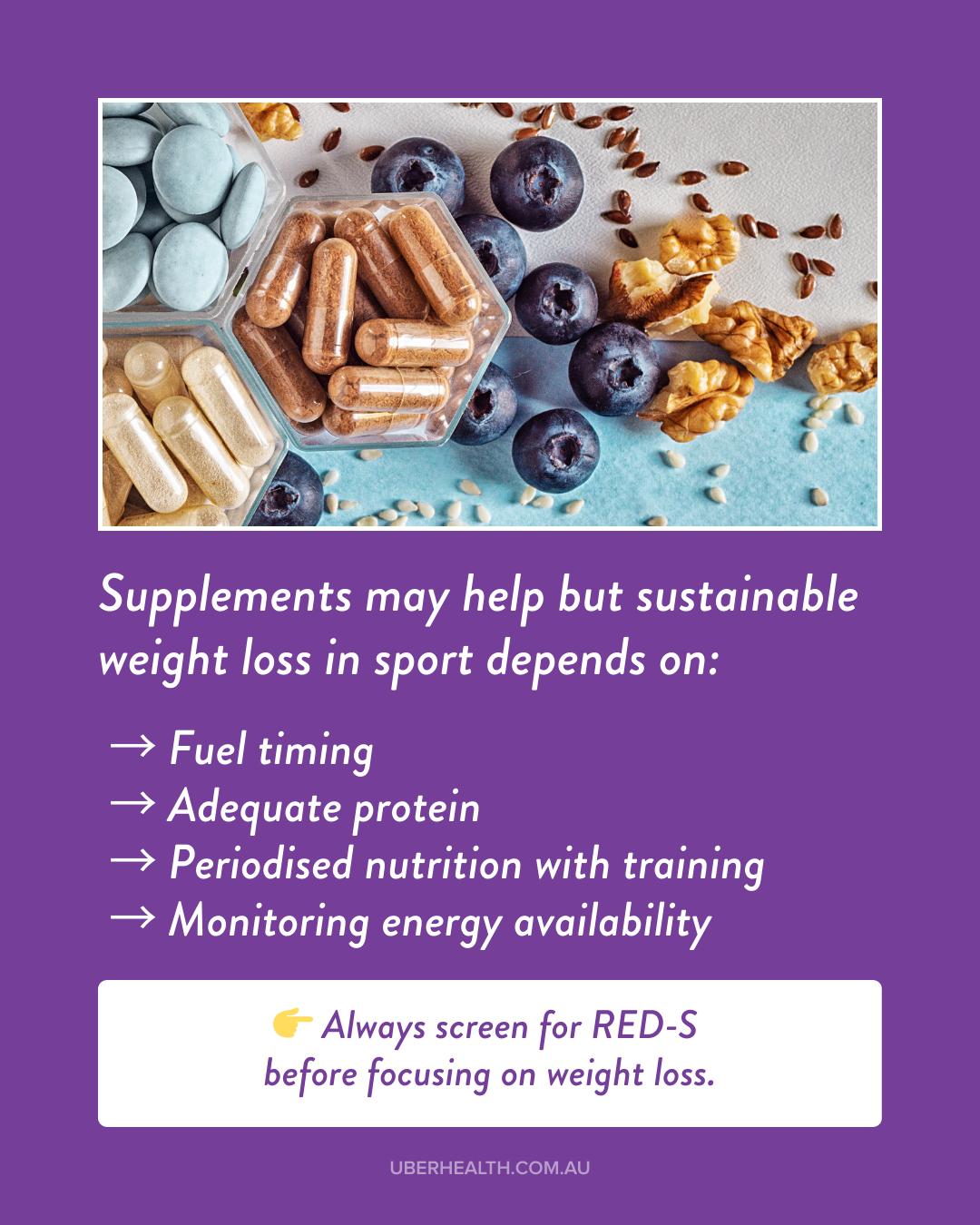 |
The Real Foundation for Weight Loss in Athletes
No supplement can replace the fundamentals.
Sustainable weight management in sport depends on five key pillars, each of which plays a role in health and performance:
-
Training 🏋️♀️
-
Structured, progressive training ensures fat loss comes from body fat — not muscle.
-
Resistance training helps preserve lean mass during calorie restriction.
-
Smart periodisation (hard vs lighter weeks) supports recovery and long-term progress.
-
-
Nutrition 🥗
-
Adequate protein protects muscle mass and keeps hunger in check.
-
Balanced macros (carbs, fats, protein) fuel both performance and recovery.
-
Strategic fuelling around sessions (pre- and post-workout meals) ensures glycogen replenishment and adaptation.
-
-
Recovery 😴
-
Sleep regulates hormones like leptin and ghrelin, which control hunger and satiety.
-
Stress management lowers cortisol, preventing stress-driven fat storage.
-
Rest days allow tissue repair and prevent overtraining.
-
-
Energy Availability ⚡
-
Monitoring intake versus output ensures athletes fuel enough to train hard while still creating a modest deficit for fat loss.
-
Prevents slipping into RED-S, protecting hormones, immunity, and bone health.
-
-
Consistency ⏳
-
The overlooked fifth pillar: sustainable weight loss comes from steady, small changes, not crash dieting.
-
Long-term consistency in training, nutrition, and recovery is far more effective than short-term extremes.
-
Supplements can help, but they are not a shortcut. A handful of evidence-based options may support weight loss in athletes. But the majority of “fat loss” supplements are either ineffective or risky.
👉 For athletes: focus on fuelling well and using supplements only to fill gaps.
👉 For practitioners: always screen for RED-S risk before recommending weight-loss strategies or supplements.
At Uberhealth, we believe smart nutrition, training, and recovery always come first. Supplements should be the finishing touch, not the starting point.
For more insights into effective weight loss strategies for athletes, see our self-study training: Applied Weight Loss Nutrition.
FREE RESOURCE


